15 Canned Sardine Brands, Ranked Worst To Best
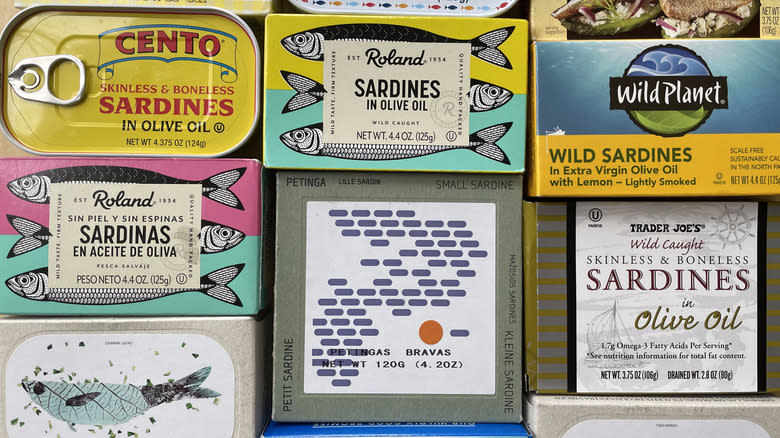
Tinned fish continues to live on in our collective culinary imagination — and for good reason: It's practically transformed the humble can into something utterly fashionable. If you're new to the realm of canned seafood (or "conservas," if you're impressing guests), a good place to start is with the sardine, the name given to upwards of twenty varieties of small, unctuous fish preserved in oil or water. These fish are low on the food chain, generally inexpensive for animal protein, and portioned into single servings perfect for solo lunches. Plus, they're tasty.
From the olive oil-packed to the seasoned, sauced, and smoked, we taste-tested fifteen varieties of sardines whose origins span from Scandinavia to the South Pacific and ranked them by flavor, texture, affordability, and sustainability. Get your seafood forks ready.
Read more: 15 Different Ways To Cook Fish
Dobrova Sardines In Sunflower Oil
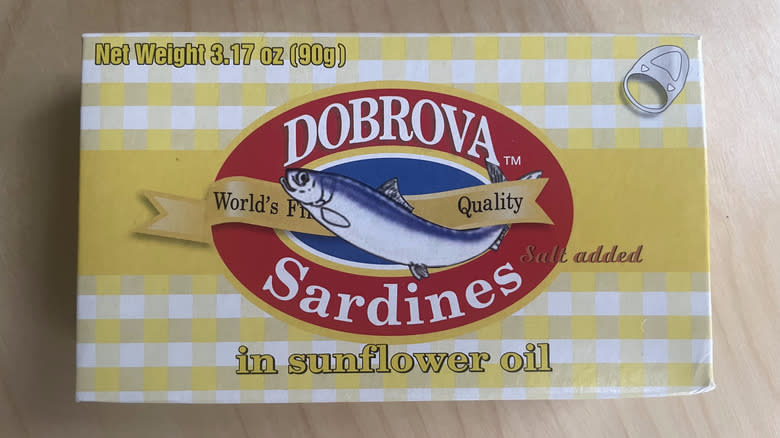
With Dobrova, a Croatian brand based out of Slovenia, you're certainly not paying for a creative director. The packaging looks as if someone designed it in Microsoft Word circa 2001. Contradictory messages and mistakes abound: We're assured of "No Additives Added." Then, in the same side panel breath lurking near the corner in cursive is a mention of "salt added." Despite these incongruences, the yellow gingham packaging is delightfully unpretentious in a Soviet Union kind of way.
If sampling this many brands has taught us anything, it's that once you pull back the tab, any fancy graphics and marketing ploys dissolve, and you're left with similar-looking fishies across tins. The rest is a matter of personal taste — one man's sardinops pilchard may be another's brisling — or fish traceability.
No country of origin or fish species is listed here, so we're left to evaluate taste. At $1.99, these sardines are the least expensive we sampled, so cheap sunflower oil is to be expected. Unfortunately, this choice tarnishes the flavor, even if you're planning on draining these sardines.
Cento Skinless And Boneless Sardines In Olive Oil
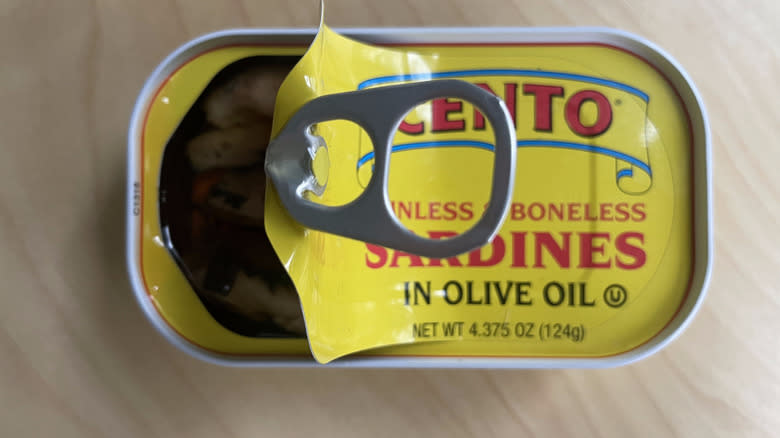
Don't confuse Cento's iconic yellow pop-top tins with their fishy cousin, the anchovy. This brand also imports sardines. Cento Fine Foods was established in 1950 by Alfred Ciccotelli, Sr., the son of a Philadelphia grocer. Ciccotelli's family store shuttered after the war, and without this business to rely on, he began working his way up elsewhere in grocery, attaining the seniority to introduce Italian specialty products to the market and eventually forming Cento.
Cento sardines are nothing special. Sourced from Morocco's massive market, the fish are mechanically deboned and packed in low-quality olive oil, which does little for the precious flavor. The fillets themselves are redeemed through ample seasoning. If you're in a bind and need to serve these sardines to guests, with its splash of color and vintage flair, the tin alone will be your saving grace.
Siesta Co. Sardines In Organic Extra Virgin Olive Oil
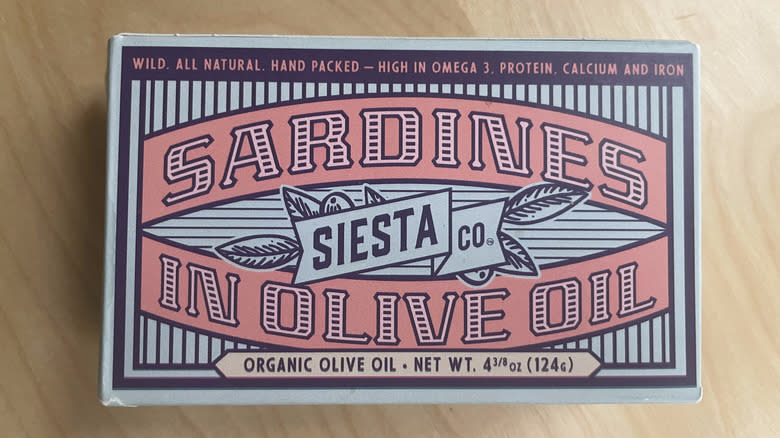
Longing to fill a void in the American market for Spanish conservas, a Los Angeles-based couple began canning their own and Siesta was born. The brand now carries products ranging from slow-cooked tuna-stuffed piquillo peppers to mackerel in extra-virgin olive oil. Each fish is harvested from the coastal town of Galicia, whose shores have attracted people looking for high-quality fish for centuries.
Siesta Co. is inspired by the laid-back ethos of the mid-afternoon work break of the same name. The brand voice is particularly soothing. ("Picture this," they tell you, "You're on a remote beach island.") While the Maritime tattoo-inspired packaging is undoubtedly cabana-chic, the fish themselves are less than seaworthy. The fishy flavor is harsh, the flesh is unpalatably firm, and scales abound. Redeeming these guys is the high-quality organic Spanish olive oil that bathes the sardines: Pour lashings of this on bread and watch the memory of the scale you pulled from your tooth wash away as if by a warm ocean wave.
Roland Skinless & Boneless Sardines In Olive Oil
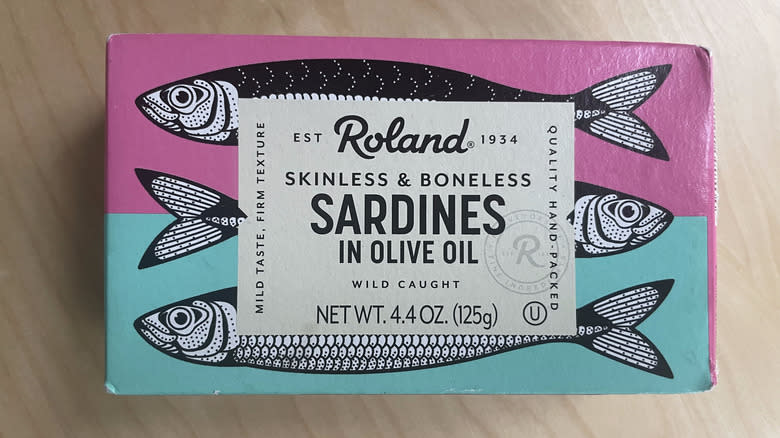
Roland is a large specialty food importer with immigrant roots. The company was founded by Bruno Scheidt, a Münchner who fled Nazi Germany by way of France, and they've been in business for over 85 years since. Roland is not a family name but a reference to the epic French poem La Chanson de Roland, popular in France and Germany at the time. The company now carries over 1,200 products, including several varieties of tinned sardines, and still works with the same supplier responsible for Scheidt's first-ever import — a dried mushroom cap from France.
There's nothing particularly nostalgic about these sardines. Like many lower-cost brands, Roland sources their fish from Morocco, a country that has somewhat of a monopoly on sardine production, producing half of all the canned sardines worldwide. Roland describes the taste of these sardines on their website somewhat blandly, as "characteristic of sardine," meaning no shortage of oily, fishy flavor. The skinless & boneless variety has more salinity than whole fish; perhaps the lack of skin allows seasoning to penetrate more effectively. The texture is firm — too firm — like overcooked fish, and when you stick your fork in to loosen up the fillets, they crumble. Not necessarily party-worthy. These would fare better in place of the tuna in tonnato, an umami-rich Italian tuna sauce.
Wild Planet Sardines In Water
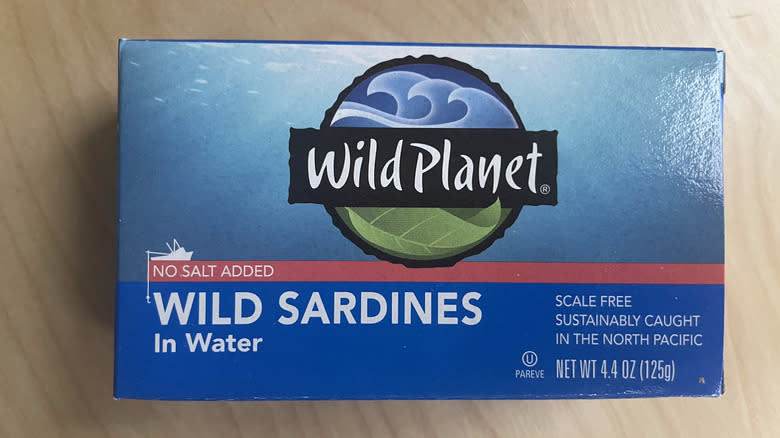
Here, we have Wild Planet's sardines sensibilities canned in a brine of water and salt instead of extra virgin olive oil. The look isn't as pleasant as oil-packed: instead of several neat rows of fish napping head-to-tail, you get a murky pool of water with little fat globules floating on the surface. And the taste isn't much better: Oil's viscousness makes it harder to detect any canned, metallic flavor, but water-packing doesn't prevent this, and the fish ends up tasting like you've licked a coin.
If given a choice between canned seafood packed in oil or water — say, you're staring down your grocery store shelf and need some way to narrow the selection, choose oil. The swap is barely detectable price-wise. And If you're trying to save on calories, draining oil-packed fish will yield a leaner, yet still buttery, bite. (When it comes to other tinned seafood, we think you should opt for tuna canned in oil, too).
BELA Sardines In Extra Virgin Olive Oil With Piri Piri And Smoke Flavor

BELA sardines are wild-caught and certified by the Marine Stewardship Council, one of the most established wild-capture eco-certifiers in the world. The brand hand-packs a large, succulent species native to European waters called sardina pilchardus. Around three inches in length, it's the most macho fish used in sardine processing and yields firm, meaty flesh. Unfortunately, because of their size, these skew heavier on the skin, scales, and bones.
Unlike the lemon variety, don't expect to see whole chilis here. Instead, BELA seasons their sardines with a natural piri piri flavor. 'Piri piri' is the name given to a number of sauces derived from the African bird's eye chili pepper, though Aleppo and other red chilis are common substitutes. Unfortunately, the pepper flavor in these sardines is hardly detectable. If you're looking for a kick, you may as well skip these — they will leave you wanting, as well as wondering if your palate has suddenly become desensitized to capsaicin.
Reese Golden Smoked Sardines
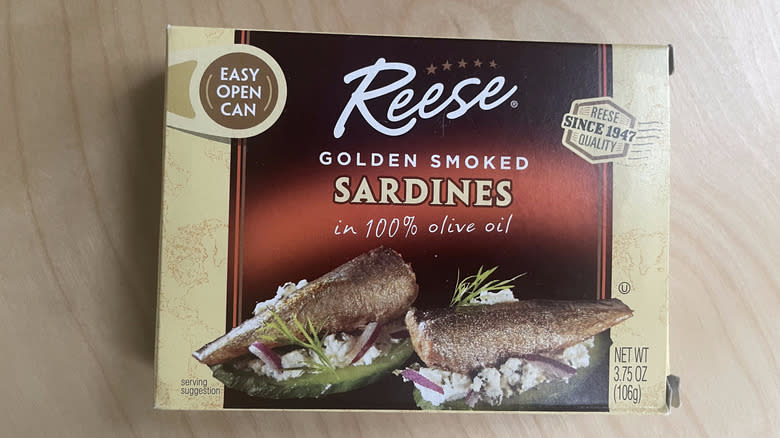
Reese is one of the nation's largest specialty food distributors. The brand was started by German immigrant Max H. Ries in 1939, who came to Chicago with entrepreneurial dreams of building a textile factory of his own but quickly pivoted to food importation, inspired by the city's vibrant, global culinary scene.
However humble its origins, Reese remains a big-box brand of sardines. Its fish is imported from Morocco, a country less fashionable than Portugal or Spain due to the high volume it exports.
At first glance, 'Golden Smoked' seems like a marketing ploy: Many brands 'lightly smoke' their sardines by adding natural smoke flavor without crowning them in 'gold.' However, 'Golden smoked' indicates the sardines are naturally smoked over a wood fire. In Reese's case, there isn't much discernible color change, but the smoky flavor is genuine. These sardines are soft — but pasty, rather than buttery, and they aren't particularly well-seasoned despite containing 200 milligrams of salt, which does little to pay off the precious smokehouse flavor.
Trader Joe's Wild Caught Skinless And Boneless Sardines In Olive Oil
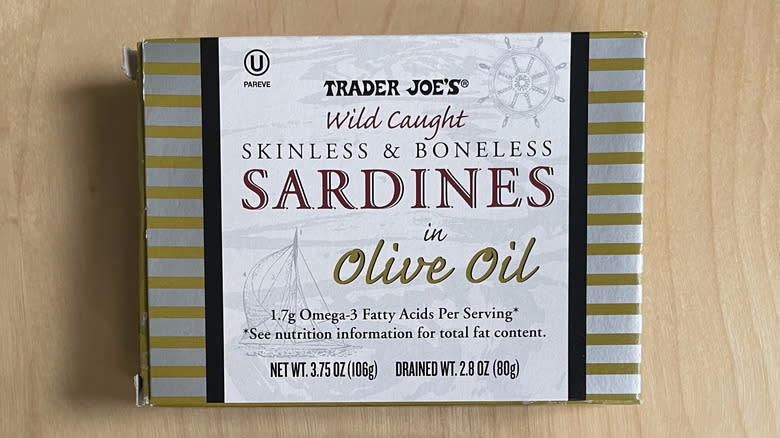
You might expect TJ's to be deep in the trendy tinned fish game already, but their selection is modest. It's also contentious: The brand sparked a comical yet inconclusive debate on Reddit when no one could figure out the origins of the whopping 300 milligrams of sodium in their low-sodium sardines in spring water.
Salt aside, without the skin or bones to contend with, these wild-caught skinless and boneless sardines are friendlier for squeamish palates. Though the flesh could use a little more seasoning, these sardines are true to their name of being virtually scale, skin, and bone-free. While most sardines opt for a narrow tin, the wideness made these easier to scoop out without breaking each sardine into pieces. Packing these in refined olive oil keeps the price low but does nothing for the flavor.
Though moderately tasty, TJ's take on sardines disappoints in the creativity department. We'd expect more from a brand that's given us such culinary inventions as cauliflower flour, plant-based "pork" rinds, and ketchup-flavored sprinkle seasoning.
JOSE Gourmet Sardines In Ravigote Sauce
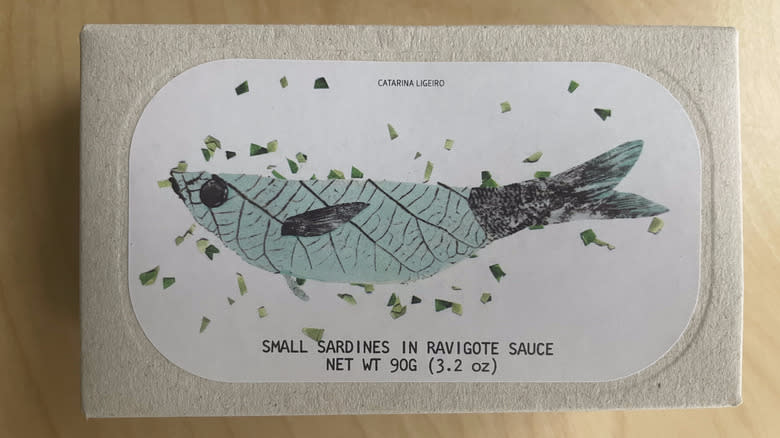
JOSE Gourmet is a conceptual brand based out of Lisbon, Portugal. Equal parts art project and mission-driven seafood retailer, they're known for their avant-garde selection of seafood, like horse mackerel and hake roe. The company's mission statement is lofty, albeit noble: to add "material and immaterial value" to the world in the form of responsibly sourced and hand-packed seafood. You'll be drawn in by the collector-worthy packaging — an intentional strategy on the brand's part to increase the perceived value of canned seafood.
These sardines in the ravigote sauce are a good place for newcomers to JOSE's library of seafood: The fish themselves are surprisingly tender and succulent, a feat for high-pressure canning, which heats the fish to anywhere between 113-160 degrees Celsius to seal and sanitize the cans properly. The herbaceous olive oil-based sauce, flecked with fresh parsley, only loses some of its brightness from the canning process. However, if you're not a fan of tartar sauce, skip these: The ravigote contains capers, onion, and cucumber pickle reminiscent of a cleaner, lighter version of the common seafood dipper.
Esplinar Baby Sardines In Spicy Sauce
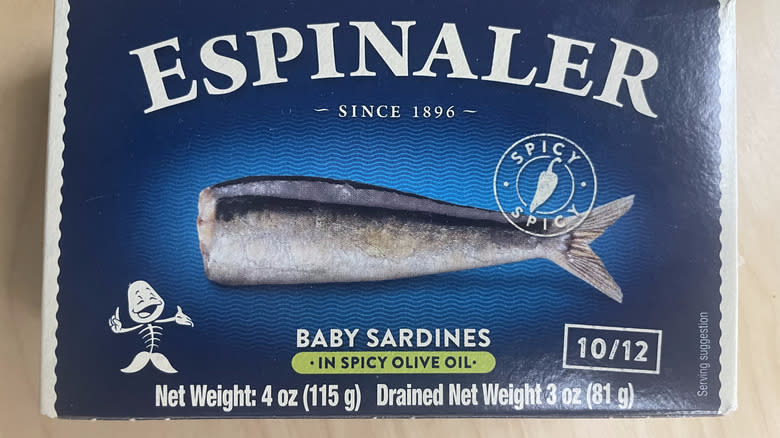
Born out of the back of a tavern in Barcelona, Taverna Esplinar, the Esplinar brand originated in 1896. After the Spanish Civil War, the tavern began selling vermouth and, eventually, preserving their own Galician seafood. Esplinar has since expanded throughout Spain with its line of sauces, tinned shellfish, and liquors. The brand is devoted to seasonality, and its key value is packing at the right time, which means harvesting fish in September at the peak of sardine season.
Don't let the label fool you: The 'sauce' in question here is not sauce but oil, and boy, does it pack a punch. Paprika gives these their kick — a good option for easing your way into conservas as the spiciness mitigates any off-putting fishiness. The fish themselves are delicate, albeit difficult to scoop out of the tin in one single piece. We'd imagine these pair best with a glass of something Spanish — maybe dry vermouth or Rioja like you would at a tapas bar in Catalonia.
King Oscar Wild Caught Sardines In Extra Virgin Olive Oil
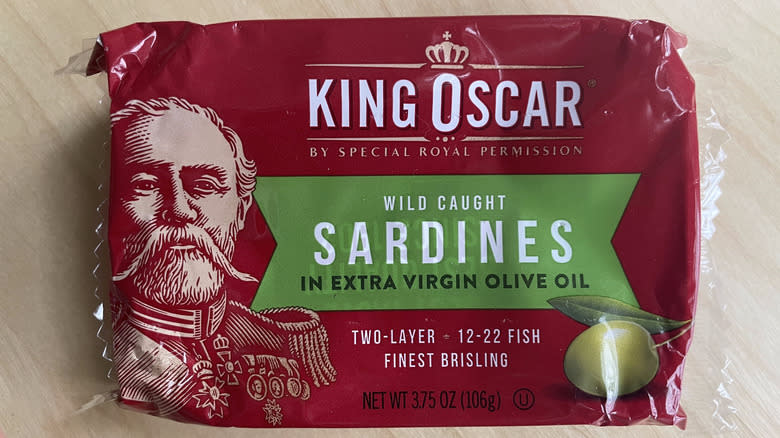
From the sunkissed water of the Mediterranean, we now head to the icy fjords of Norway, where King Oscar brand originally started canning seafood in 1873. This Norwegian-based company was among the first to develop the brisling sardine, or 'sprats' in Europe, the name given to the teeny-tiniest varieties of fish used for sardines. Though King Oscar is sold in large grocery stores like Kroger, the brand's commitment to sustainability is reminiscent of more boutique brands. All the fish King Oscar sources are fully traceable and backed by certifiers like the Marine Stewardship Council.
Maybe it's the crystal-clear Scandinavian water these fish are swimming in, but they do have a cleaner, less fishy flavor. The miniature Sprattus sprattus species is exceptionally tender — almost melt-in-your-mouth buttery. You can tell these are naturally smoked because they have a nostalgic, woody bouquet reminiscent of a bonfire.
For those looking to make a meal of it, King Oscar sells sardines packed in more flavorful sauces, like dijon, zesty tomato, and spicy cracked black pepper. Endearingly, they also sell their iconic yellow collectible pre-WWII 'Tiny Tots' tin if you're interested in turning your fish habit into a full-blown hobby.
Fangst Brisling No. 2
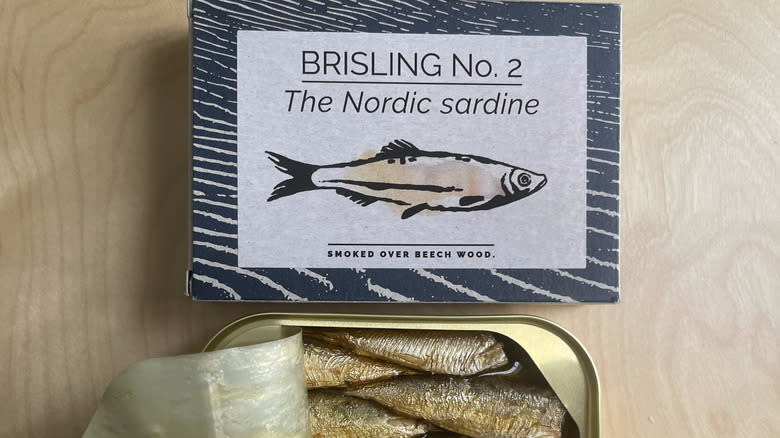
Speaking of brisling, FANGST is a small Denmark-based tinned fish company with Nordic values and a distinctively Scandinavian aesthetic. Canning, they feel, is an underdeveloped art with great potential. The brand is on a mission to reinvigorate tinned fish with the flavors of the North while utilizing bycatch and fish from fisheries certified through the Marine Stewardship and Aquaculture Stewardship Councils.
You won't find these fish swimming in olive oil, just as you won't find many olive trees floating around Denmark. Instead, FANGST packs their sardines in rapeseed oil that's cold-pressed, retaining the seed's vital nutrients. Packing these in rapeseed instead of olive oil stays truer to the fish's origins.
FANGST's No. 2 variety is smoked over beechwood, staining the neutral fat a burnished gold. Other varieties in the Danish brand's lineup, like heather & chamomile and allspice & clove, sound more like tisanes than tinned fish, but that's part of their Danish charm.
BELA Sardines In Extra Virgin Olive Oil With Lemon And Smoke
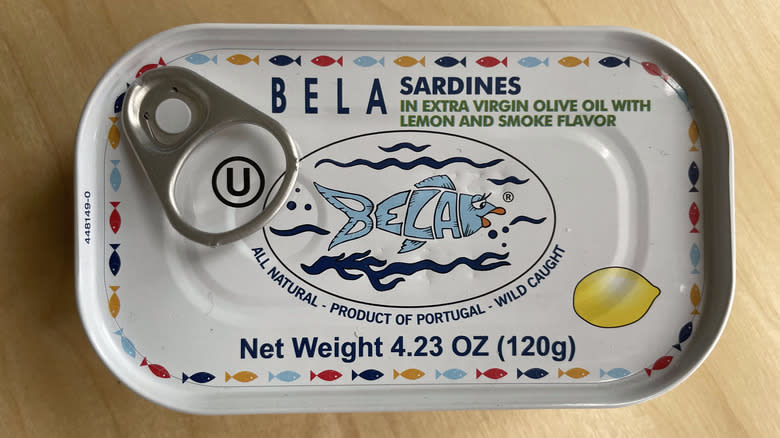
BELA sardines skip the fussy box in favor of a cleaner but no less aesthetic printed tin. With their street-art-inspired logo, these are arguably the cutest cans on the market. These sardines are sourced from Portugal in waters that stretch along the coast of the Algarve region. Portugal has a long-standing tradition of seafood canning. At one point, over 460 tinned fish factories called Portugal home.
Be forewarned: Unlike other brands, no real lemons or smoke were used in the processing of these sardines, just the essence of both. And like a heavily-spritzed perfume, the natural lemon and smoke flavors come across as cloying. Using high-quality olive oil (one could speculate it's from Portugal by the cluster of olives adorning the can) is a redemptive act on BELA's part, but if you're planning on dumping and draining, skip these in favor of something less precious: gold-green and grassy, this oil is too good to waste. Try it in Ceasar dressing, or serve the sardines with bread for dipping.
At four per tin, you get a lot of meatiness here, but you also get a proportionate amount of skin and bone. Though both are edible, for the uninitiated palate, this can take some getting used to. On the plus side, the flesh is so well-seasoned that these need only a squeeze of lemon before serving.
ABC+ Sardines In Bravo Sauce
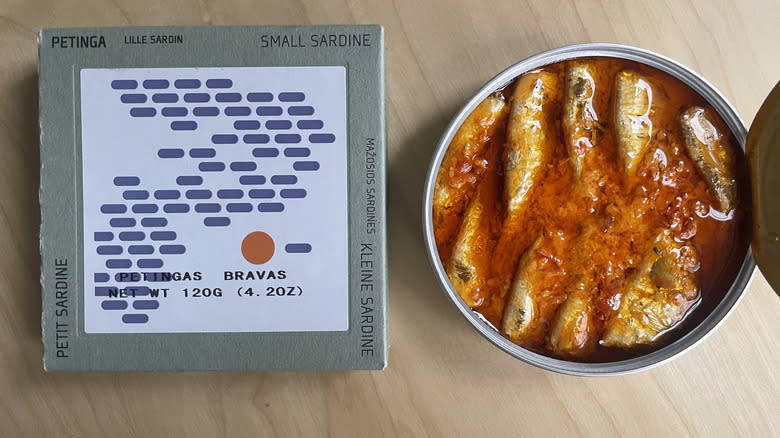
ABC+ is JOSE Gourmets' premium line of tinned seafood conservas. The Portuguese-based boutique canning brand is the smallest cannery in the country. Each tin is packed using antique equipment and sealed by hand. With a focus on flavor, the line eschews the traditional smoke, lemon, and olive oil for modern interpretations of old-world sauces. Called 'petingas,' ABC+'s small sardines are the species European Pilchard, a small-to-medium-sized fish caught off the coasts of countries like Morrocco, Spain, and Portugal. Lauded by gourmets, these sardines were awarded 'Best New Seafood Product' in 2023 by the Specialty Food Association.
At $20 a pop, ABC+ is the costliest tin we tried, but for good reason: They're hand-packed into a charmingly round tin and topped with a brava sauce inspired by the eponymous Spanish potato dish. Made from rapeseed oil, extra-virgin olive oil, peppers, garlic, and chili pepper for a subtle kick, this sauce has a surprisingly creamy consistency from the emulsified fat, and the little flecks of red pepper give it a homemade feel.
Though ABC+ claims these come from small fisheries in Portugal, they don't identify any fisheries on their website; we simply have to take their exceptionally chic packaging at face value, which isn't hard to do. Save these sardines for when you want to show off your good taste.
Wild Planet Sardines In Extra Virgin Olive Oil With Lemon
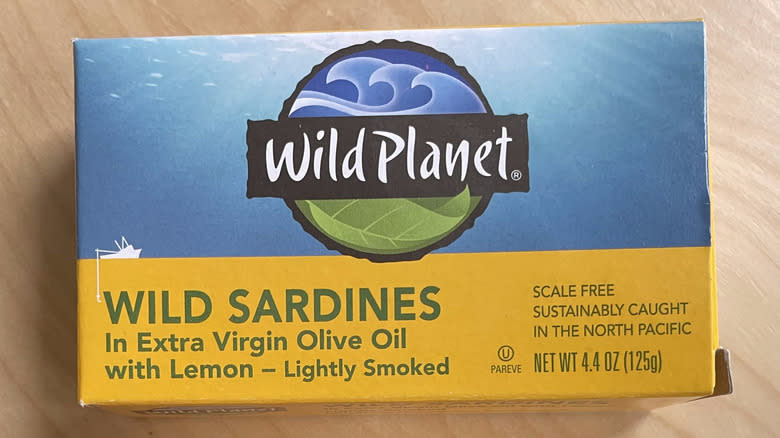
If sustainability is your primary concern, this is the brand to choose. Sporting a logo replete with green leaves, three healthy-looking tidal waves, and a color palate reminiscent of an orca whale, Wild Planet telegraphs a company ready to save our burning planet. They back up the bold claim that their sardines are 100% sustainably caught with ample evidence: Wild Planet works with well-managed fisheries in Japan, disavowing a technique called purse seining, which attracts fish beyond the target species, resulting in excessive by-catch.
For its sardines, Wild Planet sources the Japanese Pilchard, a species of fish found swimming in the Pacific. Small, slick, and eel-like, with a black sheen the color of an oil spill, these handsome fishies look sleek in the tin; you can still see the series of dots beneath the dorsal fin that identify them as the Sardinops genus. Their flesh is meaty and familiar, like high-quality canned tuna.
As for flavor, a single slice of fresh, now-confited lemon buried under the neat stack of fish gives these a genuine, pronounced lemon taste. These are packed in extra virgin olive oil that retains enough flavor and freshness; you wouldn't be wrong using the fat to dress a salad.
Read the original article on Tasting Table.

